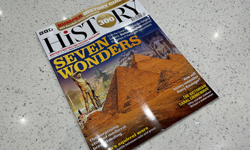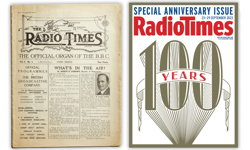Is it time for a magazine of national unity?
The upcoming election, in which the two most dynamic forces, the SNP and UKIP, don't have ideas much further developed than packing their possessions into a spotted hanky at the end of a stick and heading down to the bus stop in a fit of pique, is likely to be a disaster for the UK. That's something that both the main political weeklies, The Spectator and New Statesman, seem agreed upon. Both magazines have devoted a great deal of space recently to bemoaning how the parties you would ordinarily expect them to support are heading blindly into a right old mess.
Politics is a tiny village and I suspect that the editorial staffs of both titles would probably agree on most things if called upon to actually do something about them rather than just posture about them, much as I fancy all those PPE graduates at the top of what we still laughingly call "the two main parties" would probably get on like a house on fire if they were thrown together when the rest of us weren’t watching.
It's very instructive to listen to the two magazine's podcasts because we British are, as John Le Carré wrote, “branded on the tongue” and here both field teams who sound similarly posh and clearly couldn’t run a sweet shop (though, to be fair, The Spectator's lot do distinguish themselves by sounding slightly mad). The editorial concerns of both titles are essentially the same; they both face the same problem of how to keep people interested in what is essentially page after page of type. In this respect, the New Statesman tends to confuse understated elegance with dullness. They both have a lot of the same things, not just the think pieces about ISIS or the prospect of a Grexit, but also what you might call the hinterland coverage, which are probably the most read bits of both. They both, for instance, review the new autobiography by Kim Gordon out of Sonic Youth. In The Spectator's case, they're shrewd enough to get Tracey Thorn, more usually published in the New Statesman, to review it. By the same token, the big name top left of the cover of New Statesman is Peter Oborne, traditionally the scourge of the left on the Daily Telegraph. Strange days indeed.
I find myself wondering why they don't do some kind of joint issue in the run-up to the election or bag one with the other? It wouldn’t be merely a good gimmick. They would both probably pick up readers as a consequence. Their prescriptions may be different - though I bet the average uninitiated reader would have a lot more trouble telling them apart than the editors like to think - but what they share is a conviction that the rest of us really ought to care about the disaster we’re heading for more than we do. It’s time for a magazine coalition.
Cover stars will never be Spock famous again
I'm not sure I've ever actually seen an episode of Star Trek and I can't pretend to have ever known much about Leonard Nimoy. Nevertheless, I consider myself a student of fame and as such I recognise that Leonard was what I would call proper famous.
In fact, it strikes me that Nimoy’s death takes from us one of the last people on earth to be made genuinely world famous through the television. Furthermore, thanks to the happy accident of being in a show set in space, he was a character in a drama which could never date because it had never been contemporary. In fact, it didn't become well-known until its original series had been cancelled and after that, it could run for ever and it did.
Thanks to his famous role, Leonard Nimoy's name and fame travelled across space and time in a way that it's difficult to imagine the faces and reputations of the stars of even the biggest shows of today doing. Shows like Game of Thrones and House of Cards are genuine phenomena but they are consumed in very different ways, ways which tell us a lot about the changing nature of fame and familiarity.
These days, our interest tends to run deep and narrow. Our enthusiasms are channeled into distinct silos of interest where we don't have the foggiest idea what's going on in the silo next door. Long-form TV, which demands either total immersion or nothing at all, has made this worse. If Star Trek were to return today, it would be on its own dedicated channel and nothing of its language and lore would spill over into the mainstream. As a consequence, its biggest stars would be able to walk down your high street wholly unmolested, pretty much as I fancy a pop star like Lady Gaga or a film star like Jennifer Lawrence already can. The one kind of fame that seems to really travel across boundaries nowadays is the sporting kind. How long that will continue if sports rights continue to be sold to the highest bidder, time alone will tell.
Fame and the minute calculation thereof is a problem that magazine editors have always wrestled with, particularly when it comes to choosing suitable subjects for covers. Here it’s important to remember that fame is not the same thing as popularity, nor should it be confused with the transitory quality of heat. In fact, if I could have back all the hours and days I spent sitting in meeting rooms trying to decide whether pop star A was less or more famous than movie star B and TV presenter C, I would have had time to teach myself a few of the more difficult languages. Whoever they were, Leonard Nimoy was more famous than all of them.
The paradox of digital
Reading The Week via its app, I note their review of the Peter Pomerantsev book about adventures in modern Russia and decided to make a note to buy it later. Instinctively, I reach to put it on my reading list, make a book mark or use one of the other convenient tricks that the internet provides to lay down a marker to which to return. Since I'm reading it on an app, I can't do this. It no doubt pleases the publisher that I'm within his architecture, having bought the app, but it frustrates me because I'm used to being able to seamlessly move from one environment to another.
This illustrates the great paradox of digital communication. As soon as something is working in the producer's interest, it's no longer working in the consumer's interest. If you make something efficient enough for you to make money out of, you’re on the point of making it too broad for me to get satisfaction out of it. The traditional role of a publisher or editor was to herd large groups of people in the direction of a shared interest, much like those shepherds of yore used to do on the popular television programme One Man And His Dog. The great joy of the internet is in leaping over the fence into the field next door where, as every sheep knows, the grass is always greener.
How you could have won a PPA award
It’s that time of the year again, when your agonisingly considered and carefully laminated entries to the PPA Awards have left the office and disappeared into the mysterious process out of which winners are selected. It’s too late to do anything about it for this year but this could be useful advice for next. Having been on the judging panel for editorial awards more times than I care to recall, I'm at least qualified to tell you what sort of entries never get my vote.
Don’t gush. You may think the supporting statement accompanying your submission makes you stand out from the rest of the crowd by the way it builds up your story to make it clear that you are head and shoulders above everybody else in your competitive set. But what you probably don't realise is that everybody else in your competitive set is saying precisely the same thing and what’s more, they’re probably using precisely the same clichés to say it.
If yours is the fourth submission that babbles on about how you "live and breathe the magazine" and "really know and understand the readers" and are clearly “an inspiring leader of a very committed team" and how your timely arrival as editor was a long overdue shot in the arm for what was a title that otherwise was clearly destined for the knackers yard, then you must excuse the judges if they roll their eyes and think “not you as well".
Keep it short, keep it sharp and, above all, don't be luvvie about it. That's my advice.












